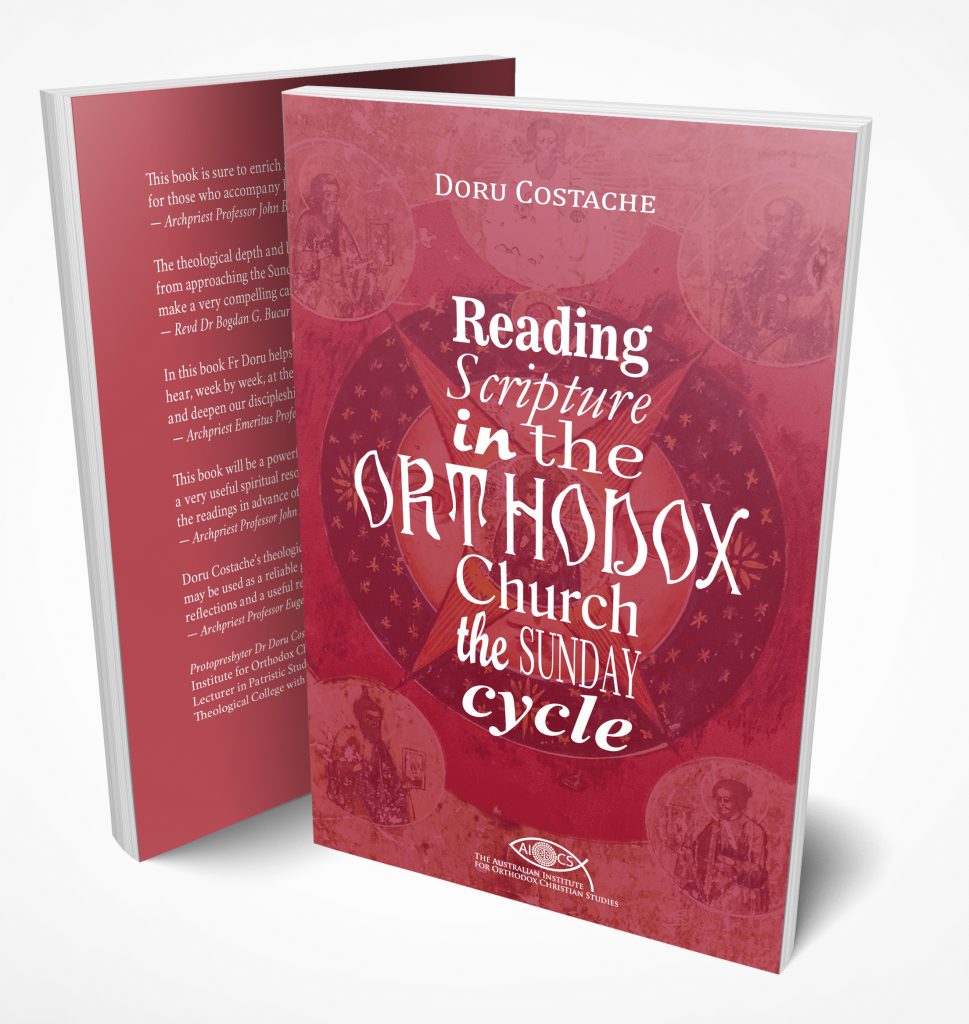Reflections on the Paschal season
Protopresbyter Dr Doru Costache
Part Three: The Third Sunday
Recorded on 6 May 2020
Free content
Topic: The church’s normal life and the status of Christian women
A related talk, my live sermon for the same Sunday
Reflective framework
The Paschal Revolution: Beyond the Forty Days with the Risen Lord
Reflection on the festival’s scriptural readings: Acts 6:1–7. Mark 15:43–16:8.
Excerpt from Reading Scripture in the Orthodox Church: The Sunday Cycle (pp. 22-23)
A lasting issue which plagues humankind is gender discrimination. With the exception of the matriarchal societies of prehistory and antiquity, women have generally lacked social and political rights. Even in contemporary societies gender discrimination is rampant. Just think of the disparity between what a man is paid and what a woman is paid for performing the same work. Or how in “traditional” families men sit at the table waiting to be served by women. Or how in certain cultures brides are sold to their husbands in slavery. And so on. Today’s readings suggest that the paschal revolution entails a reversal in the social functions of the two natural genders. According to these readings, in the early Christian days men served, whereas women were sent out to preach. Joseph performed a task that usually fell on women, namely, to prepare the body of a deceased for burial. The seven deacons of the Church of Jerusalem took care of the distribution of food and other material goods to the community. In turn, women were sent by the anthropomorphic angel to preach the resurrection of the Lord as apostles (in the Greek of the New Testament apostle means someone “mandated” or “sent” to do something). This shows that discrimination is unthinkable in Christianity. Both men and women are clothed in Christ and elevated to a dignity which no social system on earth can secure for them—to be one in Christ, to share everything in Christ, to borrow from one another in Christ, to serve each other in Christ. The paschal revolution therefore entails the abandonment of idolatry, the old ways, the ways of the world, which certain Christians still uphold with blind devotion. The paschal revolution is gospel: good news to all, regardless of gender.
Reflections on the festival’s message
Excerpts from The Orthodox Spring: A Diary (pp. 61-62, 74-75)
Christ is risen! To undertake the spiral movement, I keep saying, is a matter of revisiting old certainties in order to understand more and better, to progress, to become mature. As Saint Gregory the Theologian urged, “let us philosophise within our proper boundaries” (The First Theological Oration 5). We must live and reflect within the confines of the tradition, but we should do so freely, creatively, and joyfully, moving up and down the straight line. On the one hand, the framework, the boundaries of the tradition. On the other hand, the freedom of philosophising and thinking. We already know that when they combine—namely, the framework, represented as a circle, and free thinking, represented as a straight line—what results is a spiral. The spiral allows us to move up and down within the framework. Now, let’s learn from this lesson, not merely repeat what we heard. Let’s apply this way of thinking to everyday life, transforming knowledge into a practical tool. What results from philosophising within the boundaries of the Third Paschal Sunday? The two scriptural readings (Acts 6:1–7; Mark 15:43–16:8) list certain functional reversals. Men perform feminine tasks, I mean Joseph and the seven deacons; women perform masculine tasks, I mean the myrrh-bearers. And we read these passages on the Third Paschal Sunday since when? Perhaps since the fourth century? And what have we learnt after all this time? That men are the masters and that women are their slaves . . . That men rule and women serve . . . That men are smart while women must shut up . . . This is not what happens within the living body, where all the parts minister to all the parts. Since the church is Christ’s body (Ephesians 4:11–16), then all its parts must minister to all its parts, complementing each other and supporting each other. The Third Paschal Sunday teaches, therefore, that in Christ Jesus there aren’t masters and slaves, active members and passive members; it teaches that functional reversals are part and parcel of our ecclesial experience. The myrrh-bearers are evangelists; they do not shut up. Joseph performs the burial rite and the deacons serve at the common meals. What does all this mean today in terms of the ministry of men and women within the church? What did we actually learn after centuries of reading these passages? Nothing. Old wine in old wineskins. But the Lord reveals to us the true purposes of his Gospel: “See, I am making all things new” (Revelation 21:5). Change is possible for whoever wishes it. Change we must. Change we can; the Lord wishes it. This is Christ’s paschal work, and the Gospel makes no other promise. Let no mouth open to gainsay it. Glory be to him!
Every time I reflect upon the festival of the Virgin Lady’s entry into the (state of) temple, I remember Saint Symeon the New Theologian’s point that, through faith, we conceive God’s Word in our hearts as the Virgin did (The First Ethical Discourse 10). The Lady’s experience summarises what all believers must experience, that is, give birth to Christ mystically, or rather to their new, Christlike selves. Saint Mary’s experience, therefore, is the criterion in the light of which we grasp our destiny. We contemplate her experience and we learn what we are meant to become, Christ-bearers, by giving birth to our new selves through faith, through our conversion. This gives a whole new meaning to tapping into the feminine side within each of us; that we must anyway do; however, we must do it by interiorising the Lord’s Mother’s icon. And when that happens, namely, when we become virgins (Matthew 25:1–13) by giving birth to our new, Christlike selves, we must rethink the church, especially its androcentrism and misogyny. Until then, no wonder we are as we are. And we are as we are because we haven’t given birth to our new selves yet. Then when? Maybe next year, if we don’t forget again to reflect upon this festival and to revere the Lady whose life reveals our destiny.
6 May 2020 © AIOCS
The first part, the second part
Please support our not-for-profit ministry (ABN 76649025141)
For donations, please go to https://www.paypal.com/paypalme/aiocsnet or contact us at info@aiocs.net


